Wasps can be a nuisance when they invade your porch, patio, or deck. They can sting and cause discomfort, and their presence can ruin a good time outdoors. Fortunately, there are several ways to keep wasps away from your outdoor living spaces.
Preventive measures are essential in keeping wasps away from your outdoor living spaces. Simple steps like removing food sources and keeping outdoor trash cans tightly sealed can help prevent wasps from being attracted to your area.
Additionally, planting wasp-repelling plants or using commercial wasp repellents can be effective in keeping them at bay. If all else fails, professional pest control services can provide a more permanent solution.
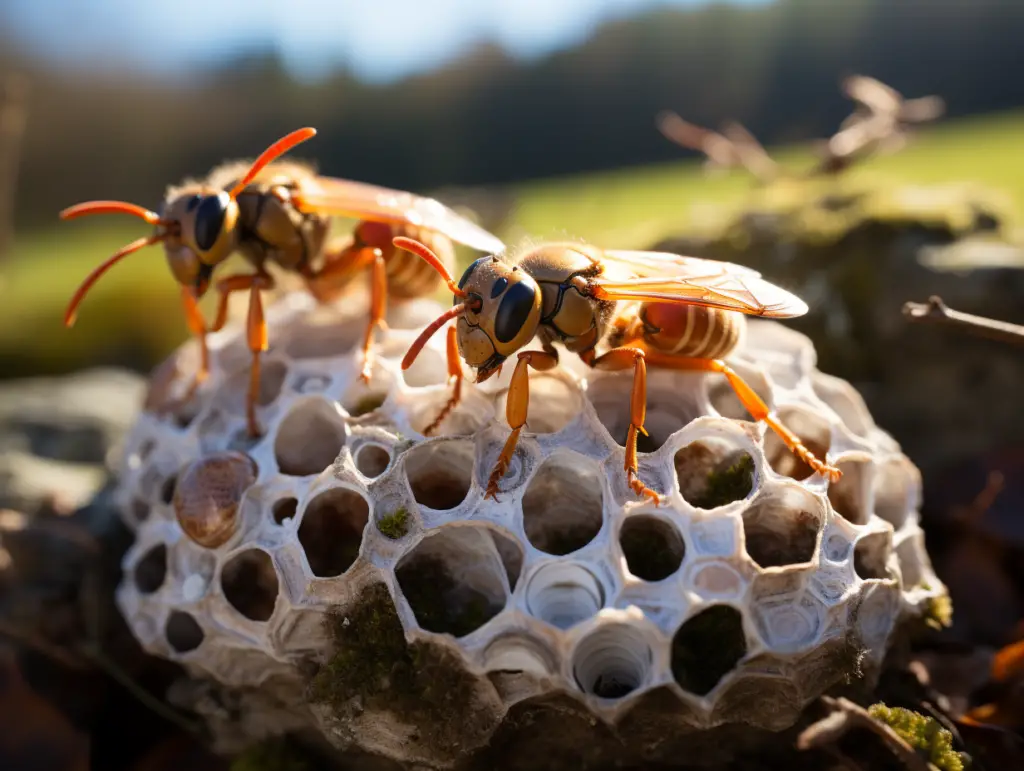
Understanding Wasp Behavior
Before discussing how to keep wasps away from your porch, patio, or deck, it’s important to understand their behavior.
Wasps are social insects that live in colonies, with each colony consisting of a queen, male drones, and female workers. The queen is responsible for laying eggs, while the workers gather food and build the nest.
Wasps are attracted to sweet smells and bright colors, which is why they are often found around sugary drinks, fruit, and flowers. They are also territorial and will defend their nest aggressively if they feel threatened.
It’s important to note that not all wasps are the same. There are many different species of wasps, each with their own behavior and nesting habits. For example, paper wasps build their nests in sheltered areas like under eaves or in bushes, while yellow jackets build their nests in the ground.
If you have a wasp problem, it’s important to identify the species of wasp so you can take the appropriate measures to remove them.
To summarize, understanding wasp behavior is crucial in keeping them away from your porch, patio, or deck. Knowing what attracts them and how they behave can help you take the necessary steps to prevent them from building a nest and becoming a nuisance.
Identifying Wasp Hotspots
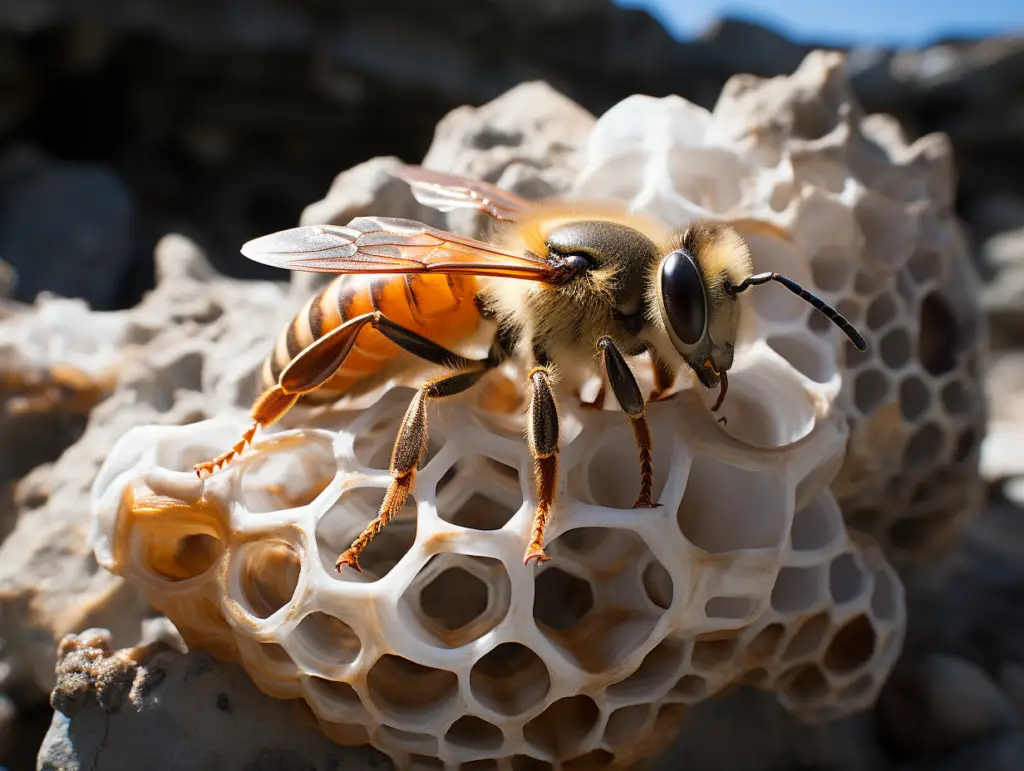
If you want to keep wasps away from your porch, patio, or deck, the first step is to identify the areas where wasps are most likely to build their nests.
By recognizing wasp hotspots, you can take proactive measures to prevent wasps from building their nests in the first place.
Recognizing Wasp Nests
One of the easiest ways to identify a wasp hotspot is to look for wasp nests. Wasps typically build their nests in sheltered areas that are protected from the elements. Common locations for wasp nests include under eaves, in attics, under porches, and in trees.
Wasp nests come in a variety of shapes and sizes, depending on the species of wasp. Paper wasps, for example, build open-celled nests that resemble an upside-down umbrella. Yellow jackets, on the other hand, build enclosed nests that are often located underground.
If you find a wasp nest on your property, it’s important to take immediate action to remove it. Wasps can become aggressive when they feel threatened, and their stings can be painful and even life-threatening for people who are allergic.
Identifying Common Wasp Species
There are several different species of wasps that you might encounter on your porch, patio, or deck. Each species has its own unique characteristics, and knowing how to identify them can help you take the appropriate measures to keep them away.
Some common species of wasps include:
- Paper wasps: These wasps are slender and have long legs that dangle when they fly. They build open-celled nests that are often located under eaves or in trees.
- Yellow jackets: These wasps are black and yellow and have a more robust body shape than paper wasps. They build enclosed nests that are often located underground.
- Bald-faced hornets: These wasps are black and white and have a distinctive white face. They build enclosed nests that are often located in trees or shrubs.
By learning to recognize the different species of wasps, you can take steps to prevent them from building nests on your property. For example, if you know that paper wasps are common in your area, you can take steps to seal up any gaps or cracks in your home’s exterior to prevent them from entering.
Preventive Measures
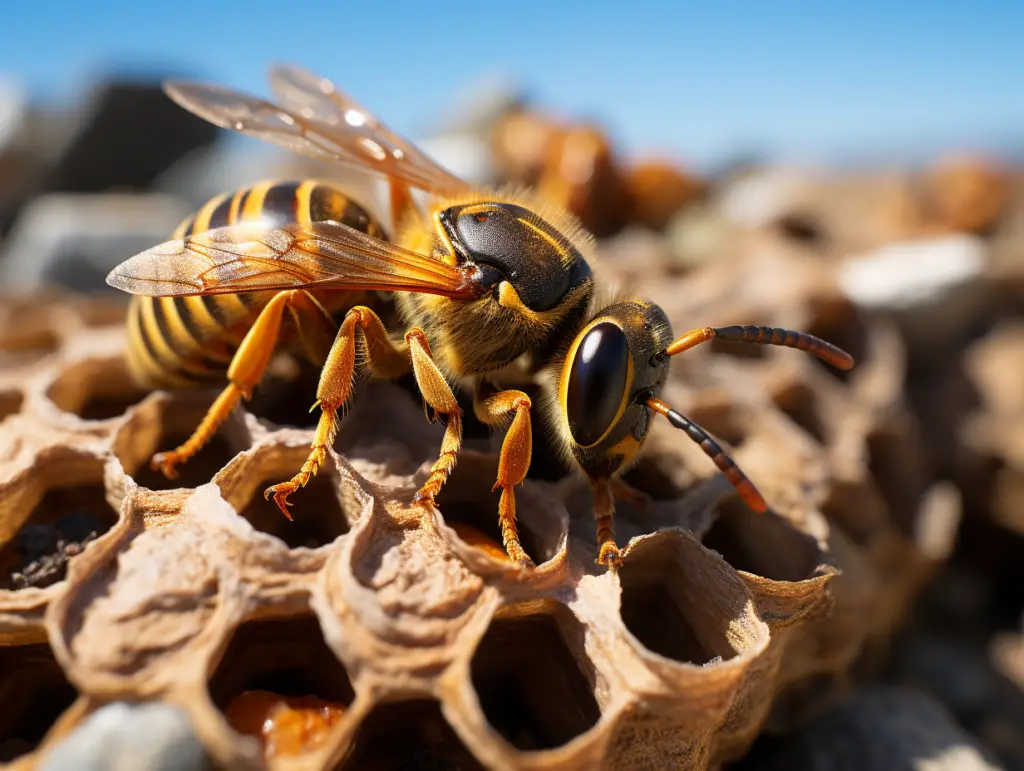
To keep wasps away from your porch, patio or deck, it is important to take preventive measures. These measures include regular cleaning, sealing off entry points, and using natural deterrents.
Regular Cleaning
One of the most important preventive measures is to keep the area clean. Wasps are attracted to food and sweet scents, so it is important to remove any food sources or scraps. Regularly sweep and clean the area, especially after meals or outdoor gatherings. Also, make sure to keep trash cans tightly sealed and at a distance from the seating area.
Sealing Off Entry Points
Wasps can enter through small cracks and crevices, so it is important to seal off any entry points. Check for any gaps or holes in the walls, roof, or flooring, and seal them with caulk or weather stripping. Also, make sure that any vents or openings are covered with mesh screens.
Using Natural Deterrents
There are several natural deterrents that can help keep wasps away from your porch, patio or deck. Essential oils such as peppermint, lemongrass, and citronella can be used as a natural repellent. Simply mix a few drops of the oil with water in a spray bottle and spray the area. Hanging decoy wasp nests can also be effective, as wasps are territorial and will avoid areas where other nests are present. Finally, planting herbs such as basil and mint can also help deter wasps, as they dislike the scent.
By taking these preventive measures, you can enjoy your outdoor space without the nuisance of wasps.
Wasp-Repelling Plants
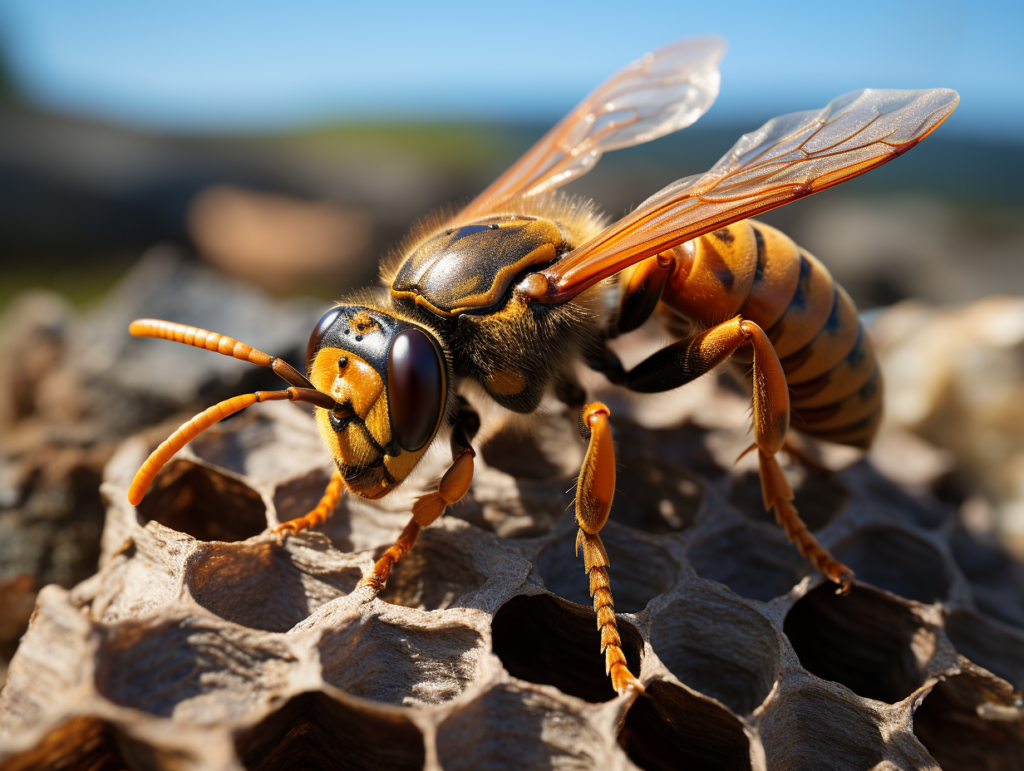
One effective way to keep wasps away from your porch, patio, or deck is to plant wasp-repelling plants. These plants contain natural oils and scents that wasps find unpleasant, and they can be used to create a natural barrier around your outdoor living space.
Here are some of the best plants to repel wasps:
- Wormwood: This plant has astringent scent that wasps dislike, making it an effective repellent. It’s easy to grow in a sunny, well-draining spot, and it’s perfect for surrounding your deck or keeping wasps away from your porch.
- Peppermint and Spearmint: The sharp and intense aroma of mint is refreshing to us but repels wasps. Planting peppermint and spearmint around your outdoor space can help keep wasps away.
- Eucalyptus: The strong scent of eucalyptus is another effective wasp repellent. It’s also a great plant to have around if you want to repel other insects like mosquitoes and flies.
- Citronella: Citronella is a well-known insect repellent, and it’s also effective at keeping wasps away. Planting citronella around your outdoor space can help deter wasps and other insects.
- Geraniums: Geraniums have a strong scent that wasps dislike, making them an effective repellent. They’re also a beautiful addition to any outdoor space.
- Marigolds: Marigolds contain a natural chemical called pyrethrum, which is toxic to many insects, including wasps. Planting marigolds around your outdoor space can help keep wasps away.
- Thyme: Thyme is another herb with a strong scent that wasps dislike. It’s also easy to grow and can be used in cooking.
Incorporating these plants into your outdoor space can help keep wasps away and create a natural barrier. However, it’s important to note that no plant is 100% effective at repelling wasps, and it’s always a good idea to take additional precautions like removing food and drink sources and sealing up any potential entry points.
Commercial Wasp Repellents
Commercial wasp repellents are a convenient and effective way to keep wasps away from your porch, patio, or deck. They come in different forms, including sprays, traps, and decoys. In this section, we will discuss the types of commercial repellents and how to use them safely.
Types of Commercial Repellents
- Wasp Repellent Sprays: These sprays contain chemicals that repel wasps, such as pyrethroids, which are synthetic versions of natural insecticides found in chrysanthemum flowers. To use them, shake the can well and spray the area where wasps are present, avoiding contact with skin or eyes. Make sure to read the label for specific instructions and precautions.
- Wasp Traps: These traps use attractants, such as sugar water or fruit juice, to lure wasps into a container from which they cannot escape. They are safe and easy to use, but they need to be emptied regularly to prevent a buildup of dead wasps.
- Wasp Decoys: These decoys mimic the appearance of a wasp nest, which can deter other wasps from building a nest nearby. They are usually made of plastic or paper and can be hung or placed on a flat surface. Keep in mind that they are not effective against all types of wasps.
Safe Usage of Repellents
When using commercial wasp repellents, it is important to follow the instructions carefully and use them safely. Here are some general guidelines to keep in mind:
- Wear protective clothing, such as long sleeves, pants, and gloves, to avoid getting stung.
- Keep children and pets away from the area where you are using the repellent.
- Do not use repellents near food or drinks.
- Do not spray repellents directly on plants or flowers, as they can harm beneficial insects such as bees and butterflies.
- Store repellents in a cool, dry place, away from heat and flames.
In summary, commercial wasp repellents can be an effective way to keep wasps away from your porch, patio, or deck. They come in different forms, such as sprays, traps, and decoys, and should be used safely by following the instructions and precautions on the label.
Professional Pest Control Services
When it comes to keeping wasps away from your porch, patio, or deck, professional pest control services can be an effective solution. These services offer a range of options for wasp control, including traps, light modification, mechanical and insecticidal controls, and physical removal.
Traps are a popular option for controlling wasps. These devices use bait to attract wasps into a container, where they become trapped and eventually die. There are several types of traps available, including hanging traps, ground traps, and bait stations.
Light modification is another effective way to control wasps. This involves using special lights that are designed to repel wasps. These lights emit a wavelength of light that is unpleasant to wasps, causing them to avoid the area.
Mechanical and insecticidal controls are also commonly used by professional pest control services. These methods involve physically removing wasps or using insecticides to kill them. Insecticides can be applied directly to wasp nests or sprayed in areas where wasps are known to congregate.
Physical removal is the most direct way to get rid of wasps. This involves removing the entire nest, including the queen and all of the workers. Professional pest control services have the equipment and expertise needed to safely remove wasp nests without putting people or pets at risk.
Overall, professional pest control services can be a reliable and effective way to keep wasps away from your porch, patio, or deck. If you’re dealing with a large infestation or are concerned about the safety of your family or pets, it may be worth considering hiring a professional to handle the problem.
Safety Measures When Dealing with Wasps
When dealing with wasps, it is important to take safety measures to avoid getting stung. Here are some tips to follow:
- Wear protective clothing: If you are planning to remove a wasp nest or spray insecticide, make sure to wear protective clothing, such as long sleeves, pants, gloves, and a hat with a veil to cover your face. This will help prevent getting stung by the wasps.
- Avoid swatting or flailing: If a wasp lands on you, avoid swatting or flailing your arms. This will only provoke the wasp and increase the chances of getting stung. Instead, remain still and wait for the wasp to fly away.
- Keep calm: If you encounter a wasp, try to remain calm and avoid sudden movements. Wasps are attracted to movement and may perceive sudden movements as a threat, which can lead to stinging.
- Remove food sources: Wasps are attracted to sweet foods and drinks, so make sure to clean up any spills or crumbs immediately. Keep food and drinks covered when dining outdoors to avoid attracting wasps.
- Use natural repellents: Essential oils such as peppermint, lemongrass, and citronella are natural repellents that can help keep wasps away. You can also plant herbs such as mint and basil around your porch, patio, or deck to deter wasps.
By following these safety measures, you can minimize the risk of getting stung by wasps and enjoy your outdoor space without any interruptions.
Conclusion
Keeping wasps away from your porch, patio, or deck can be a challenging task, but with the right approach, it is possible. The key is to make your outdoor space less attractive to these pesky insects by removing their food sources, using decoys, and setting up traps.
One effective way to keep wasps away is to remove any food sources in the area. This includes not only human food but also pet food and bird feeders. Additionally, make sure to keep your garbage cans tightly sealed and dispose of food waste promptly.
Another effective method is to use decoys, such as fake wasp nests. Wasps are territorial creatures and will avoid areas where they believe there is already a colony. Place these decoys around your outdoor space to deter wasps from building their nests.
Finally, setting up traps can help reduce the number of wasps in the area. There are many different types of traps available, including sticky traps and bait traps. Choose the one that works best for your situation and place it in an area where wasps are likely to congregate.
Overall, keeping wasps away from your porch, patio, or deck requires a combination of strategies. By removing food sources, using decoys, and setting up traps, you can create an outdoor space that is less attractive to these pesky insects. With a little effort and patience, you can enjoy your outdoor space without the nuisance of wasps.
Frequently Asked Questions
What smell do wasps hate?
Wasps are repelled by certain strong smells. Some of the smells that wasps hate include peppermint, lemongrass, and citronella. You can use essential oils with these scents to repel wasps naturally. Simply mix a few drops of the essential oil with water and spray it around your patio, porch, or deck.
What is a good deterrent for wasps?
One of the best deterrents for wasps is a decoy wasp nest. Wasps are territorial creatures, and if they see a nest nearby, they will avoid the area. You can purchase a decoy wasp nest or make one yourself using brown paper bags. Hang the decoy nest in a visible location on your patio, porch, or deck.
How do I keep wasps off my patio?
To keep wasps off your patio, you should remove any food sources that may attract them. Wasps are attracted to sweet and sugary foods, so make sure to clean up any spills or crumbs. You can also use essential oils with scents that repel wasps, such as peppermint, lemongrass, or citronella. Additionally, you can hang a decoy wasp nest to deter them from the area.
How do I keep wasps and hornets off my balcony?
To keep wasps and hornets off your balcony, you should remove any food sources that may attract them. Wasps and hornets are attracted to sweet and sugary foods, so make sure to clean up any spills or crumbs. You can also use essential oils with scents that repel wasps and hornets, such as peppermint, lemongrass, or citronella. Additionally, you can hang a decoy wasp nest to deter them from the area.
How to keep wasps away naturally?
You can keep wasps away naturally by using essential oils with scents that repel them. Peppermint, lemongrass, and citronella are all effective at repelling wasps. Simply mix a few drops of the essential oil with water and spray it around your patio, porch, or deck. You can also hang a decoy wasp nest to deter them from the area.
How long will peppermint oil keep wasps away?
Peppermint oil can keep wasps away for a few hours to a few days, depending on the concentration and how often you apply it. To make the peppermint oil more effective, mix it with water and spray it around your patio, porch, or deck. You can also use peppermint oil in a diffuser or on cotton balls placed around the area.

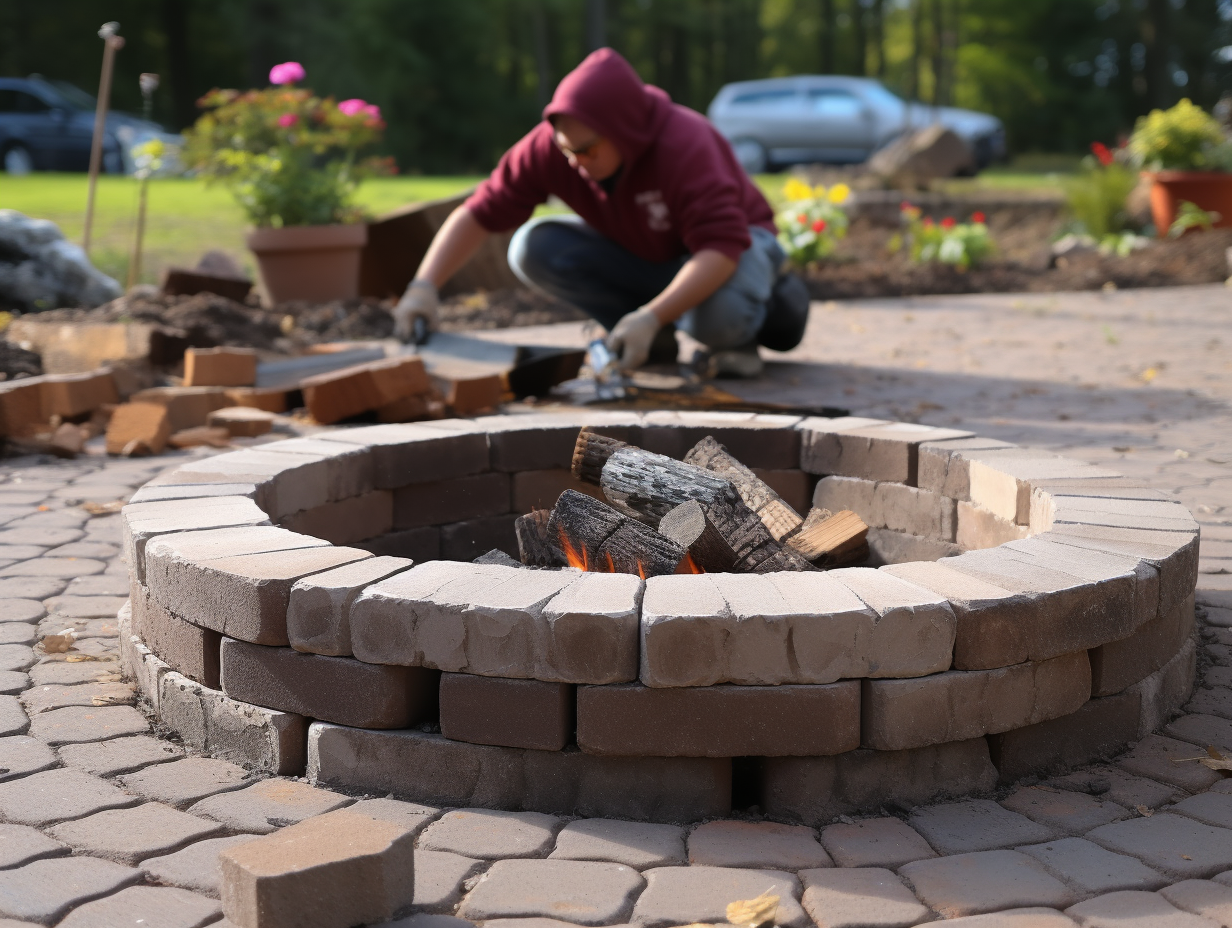

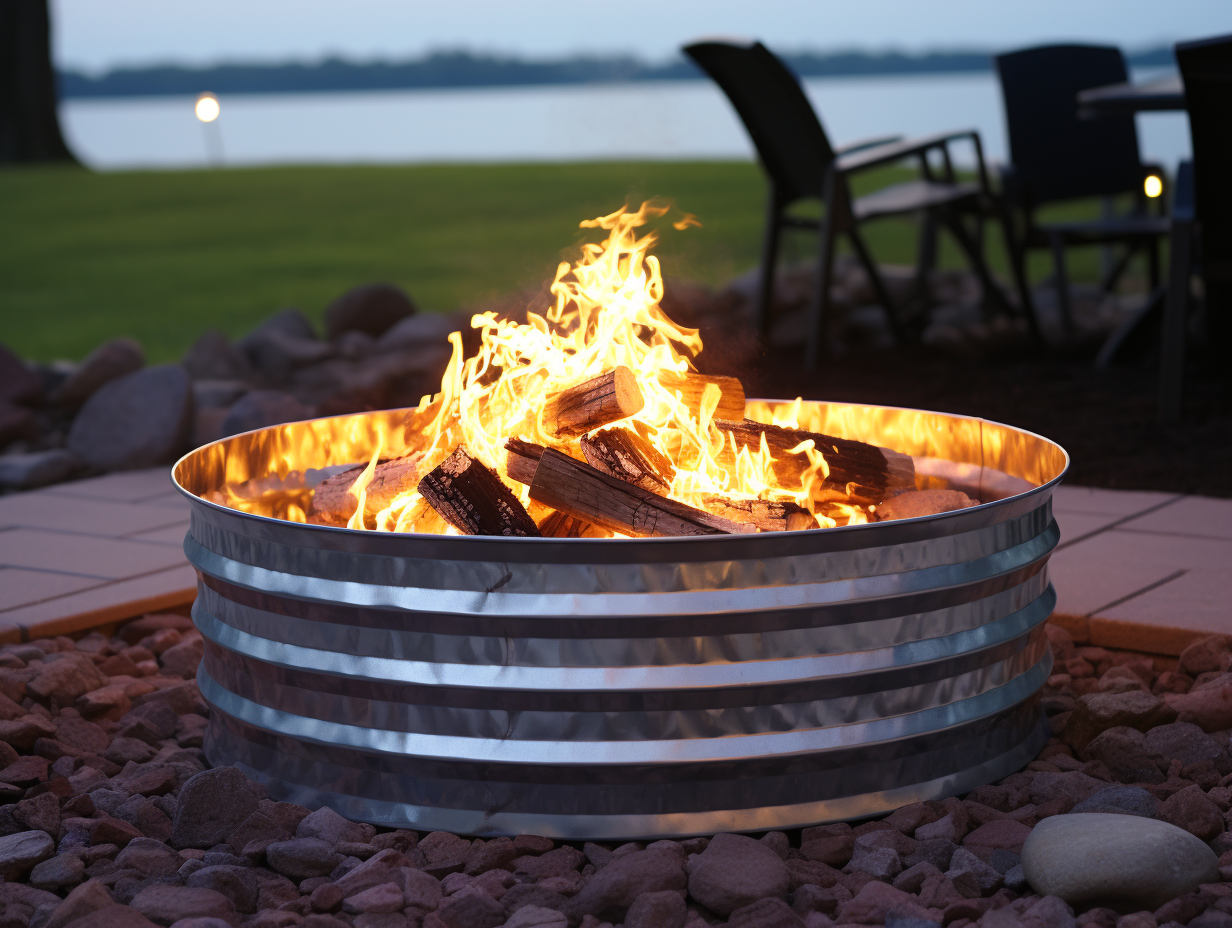

Leave a Reply